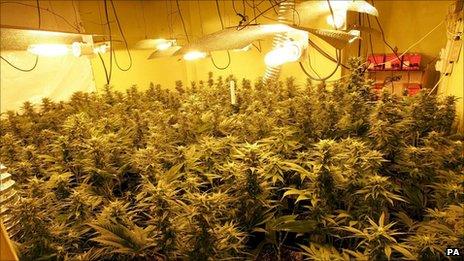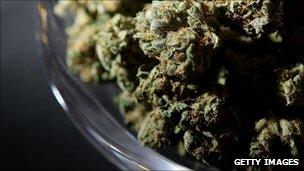Homegrown cannabis boom fired up by cash-strapped middle class
- Published

Drug dealers are renting rooms in middle class, suburban homes to grow cannabis in as they attract less suspicion from the police.
"I do have some very unruly types living near me at the moment who are dealing drugs," says Amy - not her real name.
"But the times they've been raided and I have had a wry smile thinking 'you're in the wrong place, you should be over here, this is the house with all the drugs in,' but nobody knows."
Amy is a company executive from Cheshire's "gin and Jag" belt. She also grows cannabis in her loft.
She started growing cannabis after a colleague told her how to do it. She had been buying cannabis for her partner, who has multiple sclerosis, but was not comfortable meeting dealers in deserted car parks.
Within weeks of finding out how to grow a decent crop in her own home, she had become the latest upmarket recruit to cannabis farming. Now she uses the proceeds to supplement her already substantial income.
Evidence uncovered by 5 live Investigates, external suggests that there are many more like her.
Middle-class criminality
At a time when even relatively affluent people are feeling the economic squeeze, the opportunity to turn a quick profit is, for some members of Britain's middle class, proving irresistible.

Dealers target middle-class customers to grow drugs on their behalf as they do not raise suspicion.
Amy says the tax-free cash helps her maintain a comfortable lifestyle in a part of the country known for its ostentatious footballers' mansions.
"That wasn't my motivation at the beginning," she insists.
"But when I realised how much money I was able to make on the back of this I took it a lot more seriously."
Dressed in designer jeans and wearing sunglasses on her head, Amy looks as though she would be more at home on the ski slopes of Val d'Isère than hanging out with street dealers.
Yet, despite the health risks associated with long-term cannabis use, she has no qualms about being part of this illegal supply chain.
"I'm not forcing anybody to take these drugs. It's up to the individual at the end of the day," she says firmly.
"Everyone has access to the internet, everyone has knowledge of what these things do, either first-hand or they can read about it.
"It's up to the individual and I think, in small doses, it's not a big deal for the majority of people."
Amy says the basic equipment to grow cannabis hydroponically - indoors, without soil - cost her around £2,000 ($3075) and was easy to acquire from shops and over the internet.
She sells the drugs to a local dealer, and her return is around £5,000 ($7,700) every 10 weeks - a reward which Amy believes is well worth the risk of conviction.
Not that she thinks she will get caught - Amy is confident that her background places her above suspicion:
"I live in a very nice house, with a huge garden, surrounded by people similar to myself - married couples with kids, professional people.
"I think my neighbours would be really shocked if they knew what I was doing."
Dealers target suburbs
For Jas, a drug dealer from Wolverhampton, people like Amy are his ideal supplier.
He is targeting his own middle class, suburban cannabis farmers because he also believes they can more easily avoid police detection than growers operating in more deprived areas.
Jas explains that because growing cannabis hydroponically involves intensive use of lighting and heating, the police have become adept at identifying large-scale 'farms' - where cannabis is grown in every room of a house - by sending out helicopters with heat-seeking sensors.
That is why he and other dealers have moved away from renting entire houses to grow cannabis in and instead are looking for single rooms to rent in suburban locations.
"Generally I've got a lot of clients that I sell weed to now who are middle class," he says.
"If I mention to them that they can make two to three grand in ten weeks they'll say 'what for?' and I'll say 'I need to borrow a room'."
"Most of the people that do this for me have all got jobs. They are genuinely good people."
West Midlands Police say cannabis farming is still dominated by criminal gangs, although they have come across some individual activity and spare rooms being used.
"We've been surprised at the dwellings where we're finding cannabis," Det Ch Insp Martin Hurcomb told the BBC.
"It's not just in backstreet houses but also in expensive apartments and million pound homes."
Cannabis dealer Jas cites the example of one of his growers, an IT consultant, who grows cannabis for him in a spare bedroom.
"If you saw him on the street you would never think he's got anything to do with anything illegal. I don't think he's been arrested or done for anything in his life."
"He's passed me on to a couple of other people who are interested, too."
Frank - not his real name - is another suburban grower.
He lost his job a year ago, and turned to renting out a room to a cannabis dealer to tide him over the worst of the recession. He was offered £2,000 every eight to ten weeks and regarded the risk of prosecution as minimal.
"I needed the money at the time. He [the dealer] was quiet, never bothered no-one, never made a noise. The missus knew and tolerated it for about six months until our finances were back to normal. Then he moved on.
"We were always worried about getting caught but living in a family house, the police and the neighbours - they don't suspect anything. They just thought was that he was coming round for a cup of tea."
Frank admits that if times get tough again, he will have no hesitation in returning to cannabis growing, even though he has two young children in the house.
But police say that people like Frank and Amy should not be complacent.
Det Ch Insp Martin Hurcomb of West Midlands police says:
"There is a lot of ignorance about this. Occupiers that have control of a premises, or part of it, knowing that criminal activity is taking place are not going to be treated leniently by the courts.
"They are risking a maximum of 14 years imprisonment."
You can hear the full report on 5 live Investigates, external on Sunday, 25 September at 21:00 BST on BBC Radio 5 live, external. You can listen again on the BBC iPlayer or by downloading the 5 live Investigates podcast, external.
- Published26 August 2011
- Published7 August 2011